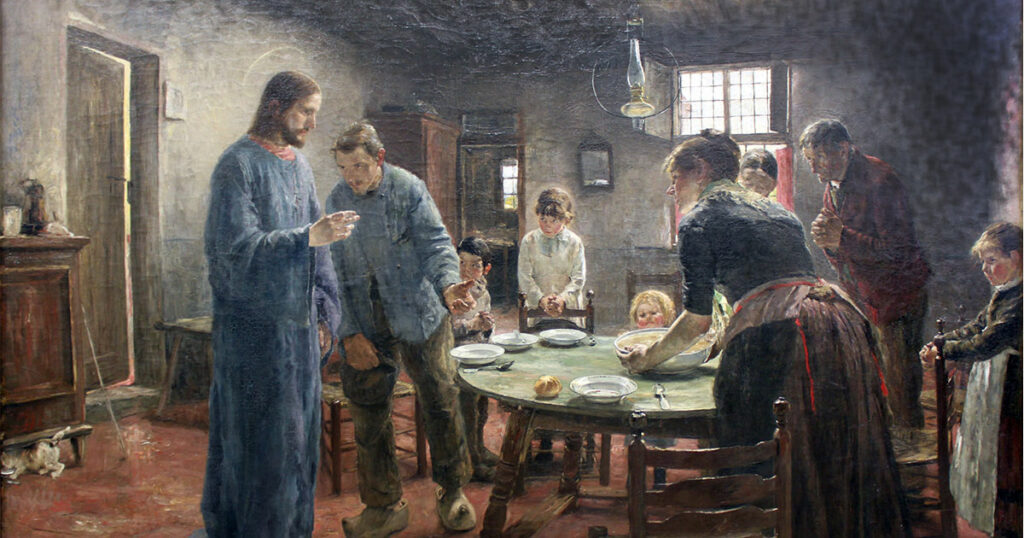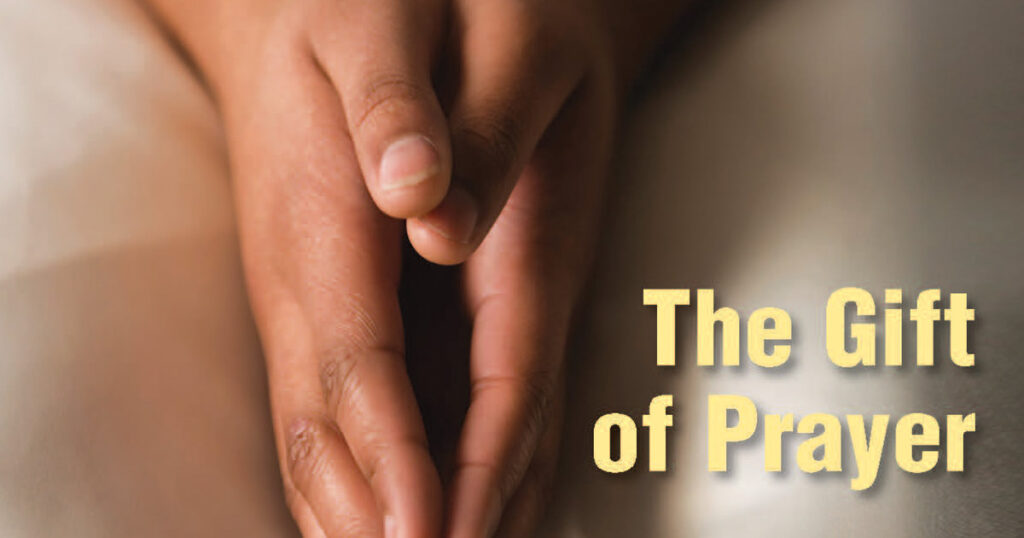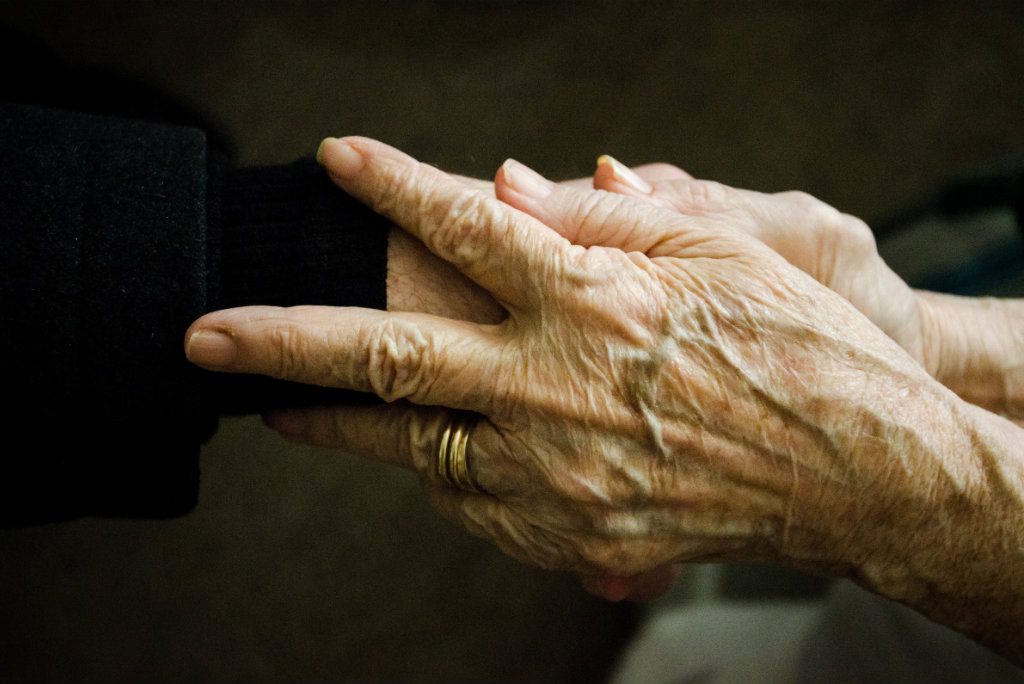When I became a Lutheran, one of the few things about my new church that I did not love was the Common Table Prayer that everyone in my congregation would say before meals:
Come, Lord Jesus, be our guest,
And let these gifts to us be blest.
This struck me as a children’s prayer, like “God is great, God is good” and “Now I lay me down to sleep.” Nothing wrong with them, but they sound like singsong nursery rhymes. I much preferred the catechism’s table prayer with its strong Biblical core from Psalm 145:15–16: “The eyes of all look to you, O Lord.”
But little did I know the depth of the Common Table Prayer and why Lutherans love it. This prayer also has a strong Biblical core: “Come, Lord Jesus” is the last prayer in the Bible (Rev. 22:20). Moreover, it is pretty much the last word of the Bible, appearing next to the last verse of Revelation, just before the closing benediction and the final “Amen.”
Scripture ends with a prayer for Jesus to return. The church prays for His return until that happens. But it is also a prayer for Jesus to come in the Gospel. A few verses earlier, the Book of Revelation reveals this to be the word of the Holy Spirit, the word of the church as the Bride of Christ, the word of those who hear this Word of God — namely, us — and also the one “who is thirsty” and in need of grace:
The Spirit and the Bride say, “Come.” And let the one who hears say, “Come.” And let the one who is thirsty come; let the one who desires take the water of life without price. (Rev. 22:17)
The Common Table Prayer asks Jesus to come into a humble context, the family gathered together for a meal. “Be our guest.” Join us. We welcome You into our home and to our table.
God gives us this day our daily bread by means of farmers and bakers, but also through the “bread winners” and the hands that prepared our meal. Thus, God is present when we sit around the table with our family to enjoy a good meal.
The 19th-century German artist, Fritz von Uhde, a devout Lutheran, made a painting of this prayer. It shows an ordinary peasant family sitting around a table and then Jesus walks in. They stand to greet Him, with bows and shy looks, as they would with any guest. Jesus, the Lord of the universe, has come to this humble family to be with them.
When we call upon the name of Jesus, as we do in this prayer, He is present with us. “For where two or three are gathered in my name, there am I among them” (Matt. 18:20).
The prayer also acknowledges that our food and sustenance are “gifts.” We receive “everything that has to do with the support and needs of the body,” in the words of the Small Catechism, from the hands of our gracious God (SC, Lord’s Prayer).
The concept of “gift” is important for Lutheranism. Our salvation is not a matter of “wages,” of getting compensated for our work (Rom. 4:4). Indeed, our work has merely earned us death: “For the wages of sin is death,” says St. Paul, “but the free gift of God is eternal life in Christ Jesus our Lord” (Rom. 6:23). Salvation is not our doing, but the gift of God’s grace. “For by grace you have been saved through faith. And this is not your own doing; it is the gift of God” (Eph. 2:8).
What is true in God’s spiritual kingdom is also true in God’s earthly kingdom. Our life is His gift. Our vocations in the home, the workplace, the society and the church are His gift. Thus, our spouse, our children and the other members of our family are His gifts. And the food that we are about to eat, after we pray, is His gift.
We pray that God will bless these gifts. And that He will bless them “to us.” They will be for our good.
This prayer helps us reflect on Christ’s presence and God’s gifts even in something as ordinary as eating a meal. We now say it in our home, too.





My family said the older version at the beginning of every meal, and at the end said ” Thank you Lord for all this food, for life and health and every good.” No one dared leave the table until we finished with prayer. I used that as a lunch prayer with my children.
My husband’s family did not have the after meal prayer. We of course continued with the older version of Come Lord Jesus.
In my father’s older years, however, as they ate daily City subsidized lunches at a Senior Center , he was asked to lead in prayer. He said in KJV “The eyes of all wait upon Thee, oh Lord, and Thou gives them their meat in due season. Thou openist Thine hand and satisfieth the desires of every living thing.” Psalm 145:15-16.
Thank you. I ne er saw the deeper meaning in that prayer. So glad I took the time to read this article and the comments.
This prayer exposes God’s continuous provisions to his people and the endless Mercy of Jesus. He comes as often to clarify that these are gifts from the Father.
Thanks Jesus for your endless blessing to the last hour.
We always say: “Let these thy gifts to us be blest…
It used to be just “thy gifts”. Leave out the “these.” This was an unfortunate change, encouraging people to focus on only the food in front of them instead of treating them as a reminder of ALL the gifts God gives, not the least of which, is our Salvation.
Exactly! Change the word and the meaning changes quite a bit. We are thanking God for ALL his gifts to us, not just the food we are about to eat and I think that’s the beauty of this prayer
We say “these thy gifts” which covers the the problems.
I (voluntarily) learned this prayer in German when I (voluntarily) created an Indepedent Study in Theological German many years ago. I still pray it in German. The version I learned was:
Komm, Herr Jesu
Sei user Gast
Und segne was Du uns
Aus gnaden bescheret hast. Amen
That last part is, somewhat literally:
“Bless what you have out of grace bestowed unto us. Amen.”
Fitting rhyme and meter into another language means you usually have to let something go, as far as exactness. So, “gifts” aren’t mentioned in German, “grace” and “bestowing” aren”t mentioned in English. (Though I guess you could say that “bestowing” is like “giving”, which is related to “gift.”)
Some German versions don’t have the “Aus Gnaden”, so the “bescheret hast” leaves ” bestowed”
C. Douglas Kroll, your minor point was certainly worth noting. At 81 years I still prefer “thy gifts” because that is how I learned it as a child. However, learning the original German and remembering where the gifts come from just reinforce that. Perhaps the modern language should be “these your” gifts.
Dr. Veith,
Thank you for the thoughts on the Common Table Prayer. I grew up saying that prayer at every meal, and we still use it every day. I do remember my grandmother saying this same prayer in German following our English version. Good memories.
Dr. Veith,
Another great article, but I’ve always had concern when they updated the common table prayer a number of years ago. It used to be “and let Thy gifts to us be blessed” and “Thy” was changed to “these” to modernize the English. Unfortunately there is a big difference between “these” gifts and “thy gifts”. “These” doesn’t say where the gifts came from. The original German was “diese Deine Geben” (lit. these Your gifts). I know this is a minor point, but I thought it worth noting.
Thank you for sharing your comments about changing “thy” to “these” very eye opening. I too notice the changes, this is a good example of how changing a word changes the meaning.